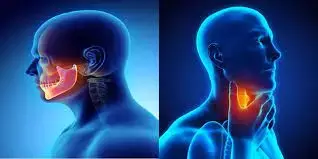- Home
- Medical news & Guidelines
- Anesthesiology
- Cardiology and CTVS
- Critical Care
- Dentistry
- Dermatology
- Diabetes and Endocrinology
- ENT
- Gastroenterology
- Medicine
- Nephrology
- Neurology
- Obstretics-Gynaecology
- Oncology
- Ophthalmology
- Orthopaedics
- Pediatrics-Neonatology
- Psychiatry
- Pulmonology
- Radiology
- Surgery
- Urology
- Laboratory Medicine
- Diet
- Nursing
- Paramedical
- Physiotherapy
- Health news
- Fact Check
- Bone Health Fact Check
- Brain Health Fact Check
- Cancer Related Fact Check
- Child Care Fact Check
- Dental and oral health fact check
- Diabetes and metabolic health fact check
- Diet and Nutrition Fact Check
- Eye and ENT Care Fact Check
- Fitness fact check
- Gut health fact check
- Heart health fact check
- Kidney health fact check
- Medical education fact check
- Men's health fact check
- Respiratory fact check
- Skin and hair care fact check
- Vaccine and Immunization fact check
- Women's health fact check
- AYUSH
- State News
- Andaman and Nicobar Islands
- Andhra Pradesh
- Arunachal Pradesh
- Assam
- Bihar
- Chandigarh
- Chattisgarh
- Dadra and Nagar Haveli
- Daman and Diu
- Delhi
- Goa
- Gujarat
- Haryana
- Himachal Pradesh
- Jammu & Kashmir
- Jharkhand
- Karnataka
- Kerala
- Ladakh
- Lakshadweep
- Madhya Pradesh
- Maharashtra
- Manipur
- Meghalaya
- Mizoram
- Nagaland
- Odisha
- Puducherry
- Punjab
- Rajasthan
- Sikkim
- Tamil Nadu
- Telangana
- Tripura
- Uttar Pradesh
- Uttrakhand
- West Bengal
- Medical Education
- Industry
Serum albumin may independently predict outcomes in patients undergoing surgical ablation of head and neck cancer

Serum albumin may independently predict outcomes in patients undergoing surgical ablation of head and neck cancer suggests a new study published in the Journal of Oral and Maxillofacial Surgery.
Patients with head and neck cancer are at increased risk of malnutrition due to tumor burden and surgical morbidity.
The purpose of this study was to evaluate the association between preoperative serum albumin and 30-day adverse outcomes in patients undergoing head and neck cancer surgery.
This was a retrospective cohort study using the American College of Surgeons National Surgical Quality Improvement Program database. Patients undergoing an ablative head and neck cancer procedure were included. Patients who had an unclear tumor location based on coding or missing outcome data were excluded. The primary predictor variable was preoperative albumin categorized as low (<3.4 g/dL), intermediate (3.4 to 3.9 g/dL), or high (>3.9 g/dL). The primary outcome variable was intensive care unit (ICU)-level complications scored using the Clavien-Dindo classification system. This is a tool used to grade surgical complications, with grade IV and V complications defined as requiring ICU-level care.
Covariates were demographic (age, sex, body mass index), medical (smoking, functional status, weight loss), and perioperative (concurrent procedures, tumor location, reconstructive modality). Descriptive, bivariate, and multiple logistic regression with bootstrap resampling statistics were used to evaluate the association between albumin and adverse outcomes. A significance level of P ≤ .05 was significant.
Results
A total of 4,491 subjects met inclusion criteria and had a documented albumin. There were 435 subjects with low albumin levels, 1,305 with intermediate levels, and 2,751 with high levels. In bivariate analysis, low albumin levels were associated with an increased risk of ICU-level complications, any complication, extended length of stay, and adverse discharge disposition (all P ≤ .001), while high levels were protective (all P ≤ .001). In bootstrapped multivariate analysis using intermediate albumin as the reference group and adjusting for demographics, tumor location, and reconstructive modality among others, low albumin levels were an independent predictor of ICU-level complications (P = .008, odds ratio, 1.64; 95% confidence interval, 1.14 to 2.40), while high levels were protective (P = .014, odds ratio, 0.689; 95% confidence interval, 0.521 to 0.923).
Preoperative serum albumin was an independent predictor of adverse outcomes following ablative head and neck cancer procedures.
Reference:
Cameron C. Lee, Tim T. Wang, Joshua E. Lubek, Donita Dyalram, :August 23, 2023DOI:https://doi.org/10.1016/j.joms.2023.08.162. Is Preoperative Serum Albumin Predictive of Adverse Outcomes in Head and Neck Cancer Surgery?
Keywords:
Cameron C. Lee, Tim T. Wang, Joshua E. Lubek, Donita Dyalram, Serum albumin, independently, predict, outcomes, patients, undergoing, surgical, ablation, head, neck cancer , Journal of Oral and Maxillofacial Surgery
Dr. Shravani Dali has completed her BDS from Pravara institute of medical sciences, loni. Following which she extensively worked in the healthcare sector for 2+ years. She has been actively involved in writing blogs in field of health and wellness. Currently she is pursuing her Masters of public health-health administration from Tata institute of social sciences. She can be contacted at editorial@medicaldialogues.in.
Dr Kamal Kant Kohli-MBBS, DTCD- a chest specialist with more than 30 years of practice and a flair for writing clinical articles, Dr Kamal Kant Kohli joined Medical Dialogues as a Chief Editor of Medical News. Besides writing articles, as an editor, he proofreads and verifies all the medical content published on Medical Dialogues including those coming from journals, studies,medical conferences,guidelines etc. Email: drkohli@medicaldialogues.in. Contact no. 011-43720751


